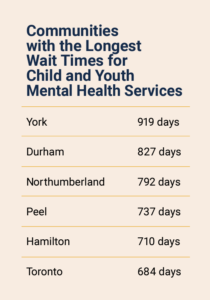

Stressed out: what people can do when therapy isn’t accessible
HealthNews Mar 28, 2023 Carolyn Burgos Cando

For a lot of students, stress is a constant. Whether it’s from the regular adversaries of life or from the particulars of the school semester, the stress levels students find themselves facing can be really high.
Those who are experiencing these high-stress situations in school often look for different outlets for treatment, but some who want to try out therapy can’t always get in to see a professional. According to the Canadian Mental Health Association, waitlists for therapy can range between six months to two-and-a-half years depending on the type of therapy the individual is looking for and whether they’re able to afford private treatment.

A chart done by a survey conducted from the Children's Mental Health Ontario on wait times for child and youth mental health services Photo credit: Children's Mental Health Ontario

Survey conducted by Children's Mental Health Ontario on regions with the longest waiting times for counselling and therapy. Photo credit: Children's Mental Health Ontario
Dr. Mikaela Mera, a PhD psychology graduate from the University of Alberta, says that school stress can come from pressure related to various outside sources as well as from within one’s self.
As school stress increases, experts say it’s important to take care of your own well-being. And some students have been able to do this without therapy as a main form of stress relief.
For example, some students say working out and going to the gym has been their main form of stress relief. According to Harvard Health Publishing by Harvard Medical School, exercise can reduce stress hormones and induces endorphin production that can aid in relaxation and stress relief.
Students also say spending time with friends and loved ones has helped them through stressful times. They say confiding in someone else has given them different outlooks on situations.
Aside from working out and spending time with friends, students have found isolating themselves to do something that takes their mind off of their own problems has helped. Students would watch a movie, listen to music, read a book, meditate or play video games to help them de-stress.
“Being able to isolate from the world outside has allowed me to focus on myself and what I need to do in order to find peace again,” says a Seneca College graduate who wishes to remain anonymous.
Although studying in the same country you initially began a college degree in can cause stress, studying abroad can also increase to those current stress levels. Aswin Nair, a Humber College journalism student who is currently studying in Scotland, says studying abroad was more difficult than he initially thought. “Studying abroad has definitely added to the stress which I wasn’t expecting. I figured because I moved from a different country before, I figured it wouldn’t be a big deal,” Nair says. “It was still stressful because I underestimated the fact that I didn’t have a support system. I had friends and family members back in Toronto that I could lean on for support and when I moved here, I was sick for multiple weeks and it made me stressed out; I realized I didn’t have the same kind of support system here,” he says.
To get through his stress from school, he tends to gravitate towards media. As it’s very accessible, it’s a quick fix to de-stress for a moment. “It’s an escape. It’s something that helps me not focus on my health issues at the moment. But in general, it helps me not worry about my stresses for a moment which helps,” Nair says.
“Another thing I’ve started doing is mindfulness before I go to bed. I just take five minutes to be mindful, go over the day and empty my mind out and try to focus on positive things. I rather not go to bed with a negative frame of mind,” he says. Nair add that this mindfulness not only helps him get in a better state of mind, it also aids him in relaxing from the stress of any school assignments. It minimizes the way assignments can feel immediate and overwhelming.
Although everyone has their own way of helping themselves with any stress they may be experiencing, talking to a professional is beneficial. If you are at a college or university, you can always check for counsellors that the school can provide.
If therapy is not an option, Dr. Mera says finding something that can help reconnect with one’s interests and something they value will aid in stress relief. Reconnecting helps remind people of the things that they enjoy — and helps them put themselves first, at least for a moment.






